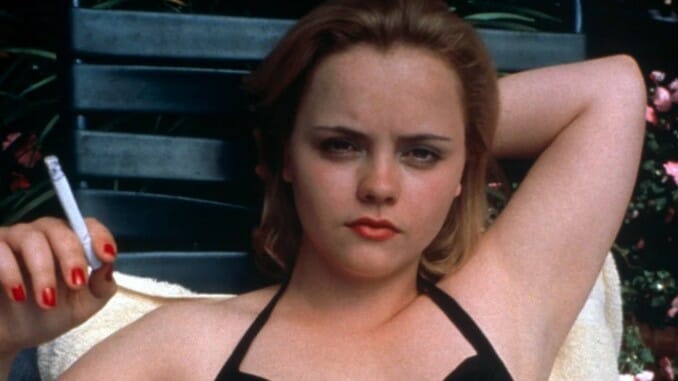The Opposite of Sex Is Christina Ricci’s Most Underrated Role

At a certain point in the 1990s, you couldn’t turn around without tripping over a movie with Christina Ricci in it. Whether that meant her popular young adult roles in films like The Addams Family or Now and Again in the early part of the decade or her more mature indie work in The Ice Storm and Buffalo ‘66 toward its end, there was a time when it felt like the actress was literally everywhere. (And that time was freaking great, to be clear.) But then it just seemed as though she…wasn’t.
That Ricci—and several other ‘90s It Girls like her, from Juliette Lewis to Winona Ryder and even Alicia Silverstone—seemed to essentially disappear after the turn of the millennium is the sort of inexplicable tragedy the film industry often seems to visit upon women who are deemed too difficult, too strange or too generally weird for traditional mainstream success. And Ricci’s always been sort of weird in the best possible ways, frequently drawn to complicated, offbeat characters with dark and moody underpinnings. Perhaps a more traditional sort of career would have never been in the cards for her, even in the best of circumstances. But, thankfully, many of these women (including Ricci herself) have found comeback vehicles in recent years as we all reckon with many of the terrible choices and assumptions we made about “difficult” or “different” women in the ‘90s.
Showtime’s Yellowjackets has become one of the few genuine word of mouth television hits in recent memory, with its twisty dual timeline mysteries and uncomfortable hints of cannibalism. Ricci’s performance as the deliciously unhinged yet strangely compelling Misty Quigley is a big part of the reason why.
Yellowjackets’ success has catapulted the actress back into the public eye in a way that her roles in lesser series like The Lizzie Borden Chronicles or Z: The Beginning of Everything failed to, and as a result, it finally feels like we’re getting the Ricci Renaissance we’ve all waited the better part of two decades to see. (Did I shriek a little when she also popped up in The Matrix Resurrections out of nowhere? Absolutely. What a time to be alive!)
But though Ricci’s buzzy Yellowjackets role (pun very much intended) may have landed her back on the path toward the mainstream success that has so often eluded her, Misty is hardly the first time she’s managed to give a character who initially seems like a complete sociopath compelling and occasionally even sympathetic layers. Ricci’s performance as the sullen, unlikeable teen narrator of the 1998 dark comedy The Opposite of Sex earned her an Independent Spirit Award nomination for the deft way it both skewers and subverts established expectations about what this kind of movie should be and do. Even now it remains a film that entirely too few people have actually seen.
Don Roos’ directorial debut is, as the title suggests, an exploration of sex, relationships and the stupid, selfish decisions we frequently make in the name of our attraction to others. Yet, it’s also a surprisingly hopeful and affecting affirmation of love in all its forms, though its soft and sentimental heart comes thoroughly coated with an outer shell of pitch-black cynicism. Hilarious, awful, and strangely heartfelt by turns, it’s a film that’s part femme fatale parody, part quippy teen drama and part road trip heist adventure, complete with a Friends actress (Lisa Kudrow, in what is still probably her best role to date) and a country music star (Lyle Lovett) thrown on top.
-

-

-

-

-

-

-

-

-

-

-

-

-

-

-

-

-

-

-

-

-

-

-

-

-

-

-

-

-

-

-

-

-

-

-

-

-

-

-

-








































